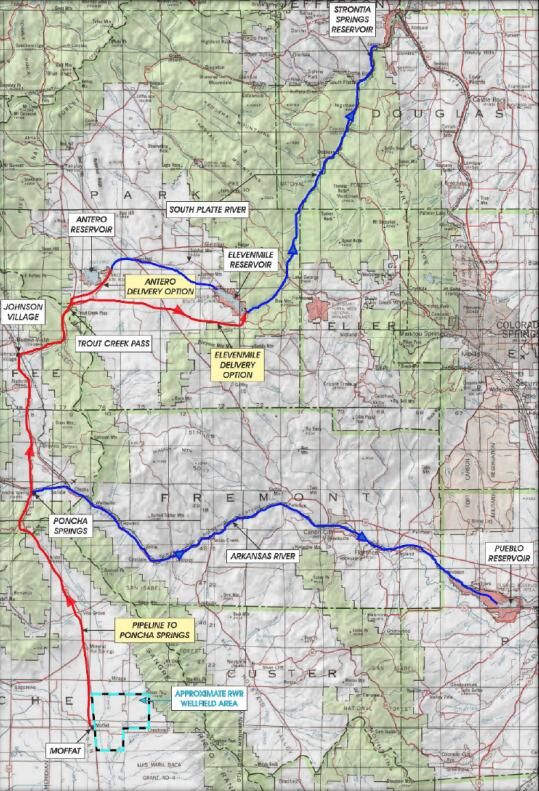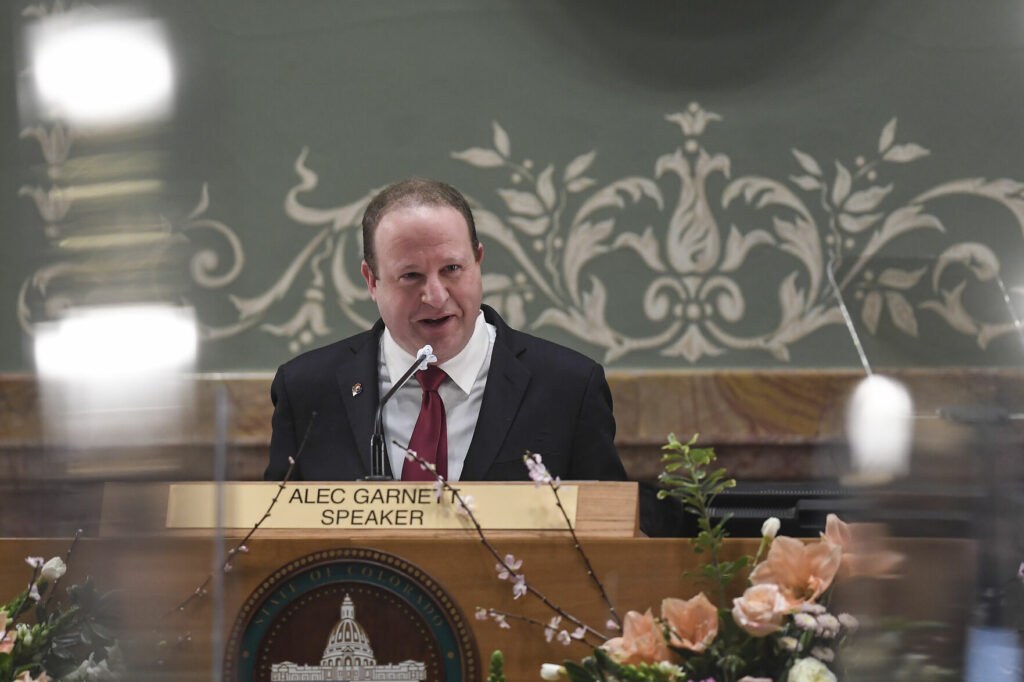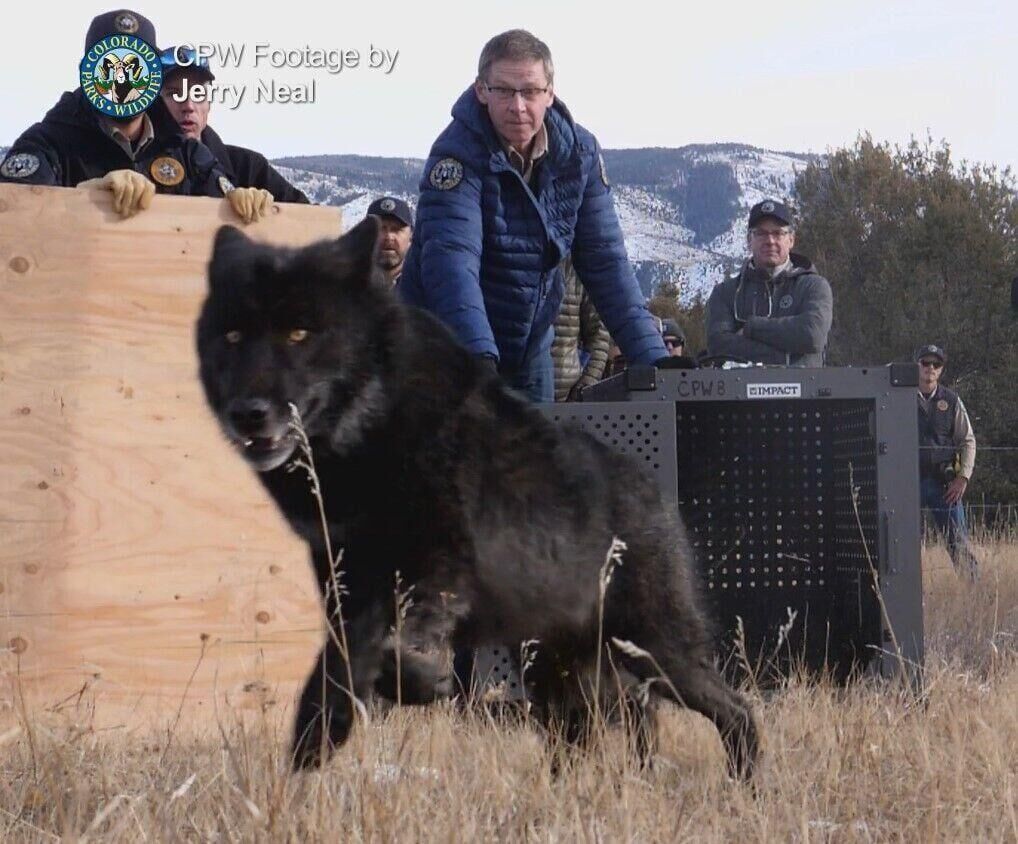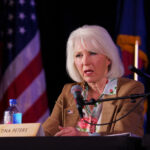Douglas County commissioners reject using federal money for water project, will continue talks

A majority of Douglas County commissioners on Tuesday indicated opposition to a proposal to put in $10 million from the county’s federal American Rescue Plan Act allocation toward a $600 million project that would ship water to the country from the drought-riddled San Luis Valley.
The project, several years in the making, is promoted by Renewable Water Resources, a company that includes among its principals former Gov. Bill Owens.
Commissioners Lora Thomas and Abe Laydon both said they were against using ARPA dollars, based on recommendations from water attorneys. Commissioner George Teal, a longtime advocate for the plan, remains in favor.
At the heart of Tuesday’s decision: Two memos from water attorneys regarding the project that has been kept under wraps since mid-March. Commissioners authorized their release to the public Tuesday.
The first memo, dated March 23, is from attorneys Stephen Leonhardt and April Hendricks of the firm Burns, Figa & Will. Its executive summary said there is “no unappropriated water” available in the confined aquifer, the source for the RWR project. In addition, RWR has not come up with an augmentation plan in sufficient detail to demonstrate that its plan will meet the requirements of the state water rules and avoid injury to other water rights, the memo added. The RWR project “is not consistent” with the state’s water plan, so no state dollars would likely be available for it; and that Douglas County will face numerous hurdles to obtain federal, state and county permits for the project after a decree from state water court is entered. “RWR does not intend to obtain permits before going to Water Court, and RWR’s current proposal calls for Douglas County to bear all responsibility for obtaining the required permits for this project. Obtaining the required federal, state, and county permits likely will take several years, at a substantial financial cost to Douglas County, with a risk that one or more permits will be denied.”
The May 2 memo notes that Leonhardt and Douglas County attorney Lance Ingalls attended a meeting with RWR’s attorneys at Brownstein Hyatt Farber Shreck as well as RWR principal John Kim on April 1.
“Lance and I agreed that the information and explanation from RWR’s attorneys did not change our conclusions on ARPA as presented in our March 23 memorandum,” Leonhardt wrote.
The May 2 memo is divided into several sections, including water availability, sale of water rights, water supply impacts, sustainability of the closed aquifer, and dry-up of irrigated agricultural lands. Among the findings:
- Questions on whether ARPA money could be used for the project
- Recognition that an RWR-supported community fund would not mitigate economic losses from the dry-up of irrigated lands and impacts on related businesses
- Opposition from the Rio Grande Water Conservation District, which is managed by state Sen. Cleave Simpson, R-Alamosa, a major opponent of the projects
- Difficulty in rehabilitating the land once the water is removed
- The closed aquifer cannot sustain any new pumping, and that a buyer of water rights could only use those rights for their originally decreed purposes, meaning RWR would have to go to water court to change those uses from agricultural to municipal, which could mean a lengthy court battle
Said Leonhardt: “We still cannot recommend acceptance of RWR’s proposal at this time; the recent meetings have confirmed the major impediments to the completion of this project. The two reasonable options would be to (1) reject the proposal; or (2) continue discussions with RWR (and perhaps other interested parties in Douglas County and/or the San Luis Valley) to see if agreement can be reached on an acceptable proposal.”
“I did the right thing early on” to oppose this project, Thomas told Colorado Politics Tuesday, adding that she did her own research and came to the same conclusion as the attorney who wrote the memos, which cost the county $40,000, she said.
The plan is also opposed by virtually every major elected official in Colorado, including Gov. Jared Polis, Attorney General Phil Weiser and U.S. Sens. Michael Bennet and John Hickenlooper, U.S. Rep. Lauren Boebert, R-Silt and her primary opponent, state Sen. Don Coram, R-Montrose.
Both Laydon and Teal directed the commission’s staff to continue working on a deal with RWR that does not use ARPA money.
The project would move 22,000 acre feet of water from a confined aquifer in the San Luis Valley through a yet-to-be constructed pipeline and up to a yet-to-be-identified water provider in Douglas County.
The project would require a $10 million investment from the county, paid for with American Rescue Plan Act dollars, out of the total cost of around $600 million. RWR would pay those willing to sell their water rights about $2,000 per acre-foot, although water experts in the valley say that is about half of its value. RWR would then charge the water district that buys the water $19,500 per acre foot.
RWR’s Sean Tonner argued that the RWR project would economically benefit the valley, which he said is among the most impoverished areas of the state at 43% below the poverty level and where population is declining and getting older.
“We can have both: We can have the Front Range being vibrant; the Front Range needs water. We can have the San Luis Valley being vibrant; it needs capital and needs to transition its economy to something lower than 90% to 95% agricultural-based,” he told Colorado Politics in March. “We’re not saying shut down all ranching and farming, but have a more diversified economy outside of government jobs and agriculture.”
Critics, however, say a $50 million community fund proposed by RWR would not mitigate even one year’s economic losses the valley would experience as a result of the loss of that water to agriculture and related businesses.
In a statement after the meeting, the Douglas County Commissioners said the board decided, based on objective legal recommendations from outside counsel, that American Rescue Plan Act (ARPA) funds are inapplicable to the RWR proposal and that RWR has significant additional hurdles to overcome in order to demonstrate not only a “do no harm” approach, but also a “win-win” for Douglas County and the San Luis Valley.”
“That said, Douglas County welcomes ongoing discussions with RWR, should they be able to provide new information or otherwise overcome these hurdles,” the statement concluded.
“This is good news for the San Luis Valley and it speaks to the hundreds and perhaps thousands of people who spoke out against this unviable proposal,” Simpson said. “The San Luis Valley residents, water providers, environmental and conservation groups, agricultural interests, businesses and even many Douglas County residents submitted letters expressing opposition and attended numerous work sessions presenting a mountain of evidence why the RWR proposal is not a win for Douglas County nor the San Luis Valley,” he added.
RWR, in a statement sent to Colorado Politics, said “we’re appreciative of the unprecedented level of scrutiny and due diligence our project has undertaken throughout this process. In the arid West, no water project is easy. There is no one silver bullet for finding solutions to our state’s water crisis. High-quality, renewable, and cost-effective water resources — as our project has identified — are essential for Colorado’s water security and independence as much as they are rare.”
The company “is pleased and encouraged to engage in further dialogue with Douglas County as we work together on a real water solution for Douglas County. Our team is eager to address the County’s remaining questions as raised in the legal analysis. We are confident in our ability to mitigate any areas of concern.”
Burns FIga Will March 23, 2022 memo to Douglas County regarding RWR projectDougCo memo from water attorney Stephen Leonhardt, dated May 2, 2022














